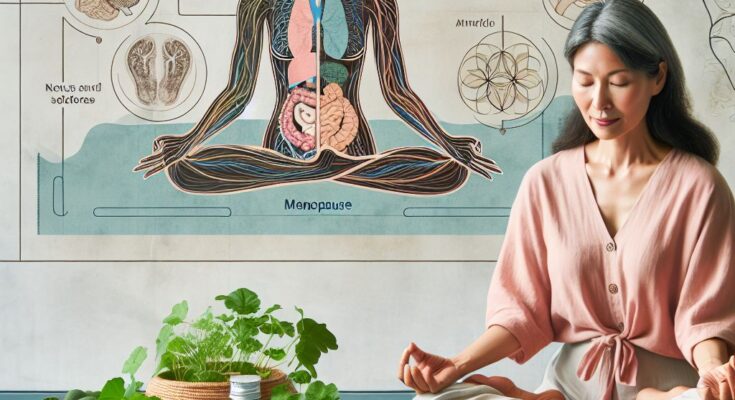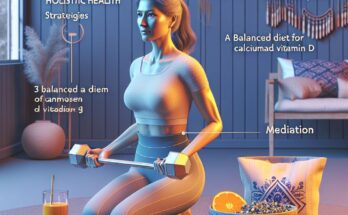Explore holistic Ayurvedic anti-aging practices to enhance menopause health. This guide delves into how balancing the Vata dosha can ease symptoms, while Ayurvedic herbs like Shatavari, Brahmi, and Ashwagandha provide natural relief. Learn the importance of daily routines and self-massage (Abhyanga) for maintaining well-being, and discover the rejuvenating benefits of Panchakarma therapy for deep detoxification and revitalization during menopause.
Key Takeaways
- Holistic Ayurvedic practices can ease menopause symptoms and promote overall well-being.
- Balancing Vata dosha is crucial for managing menopause symptoms.
- Ayurvedic herbs like Shatavari, Brahmi, and Ashwagandha offer natural relief.
- Daily routines and self-massage (Abhyanga) play significant roles in maintaining health.
- Panchakarma therapy provides deep detoxification and rejuvenation.
The Essentials of Holistic Ayurvedic Anti-Aging Practices for Menopause
Menopause is a natural phase in a woman’s life, but it often brings a host of uncomfortable symptoms. Hot flashes, mood swings, and sleep disturbances can make this transition challenging. Fortunately, Ayurveda, an ancient system of natural medicine, offers holistic practices to ease these symptoms and promote overall well-being.
Understanding the Menopausal Transition
Menopause marks the end of a woman’s menstrual cycles, typically occurring in her late 40s or early 50s. This transition is driven by a decline in estrogen and progesterone levels, which can lead to various physical and emotional symptoms.
According to Ayurveda, menopause is a time when the Vata dosha (one of the body’s fundamental energies) tends to become imbalanced. This imbalance can exacerbate symptoms like dryness, anxiety, and insomnia. Therefore, balancing Vata is crucial for managing menopause effectively.
Benefits of Holistic Ayurvedic Practices
Ayurveda offers a range of natural remedies that can help manage menopause symptoms and improve overall health. These practices include dietary recommendations, herbal treatments, lifestyle modifications, and specialized therapies.
“By incorporating Ayurvedic practices into your daily routine, you can experience a smoother transition through menopause and enjoy better health and vitality.”
Ayurvedic Dietary Recommendations for Menopause
Diet plays a significant role in balancing the doshas and managing menopause symptoms. Ayurveda emphasizes eating foods that are nourishing, easy to digest, and tailored to your individual constitution.
Balancing Vata Dosha
To balance Vata during menopause, it’s essential to consume warm, moist, and grounding foods. These can help counteract the dryness and instability associated with Vata imbalance.
- Include cooked vegetables, whole grains, and warm soups in your diet.
- Favor foods with sweet, sour, and salty tastes.
- Avoid cold, raw, and dry foods as they can aggravate Vata.
Incorporating Cooling Foods
Besides balancing Vata, it’s also important to incorporate cooling foods to manage hot flashes and inflammation. These foods can help soothe the body and reduce internal heat.
- Opt for foods like cucumbers, melons, and leafy greens.
- Include dairy products like milk and ghee, which have cooling properties.
- Drink plenty of water and herbal teas to stay hydrated.
Avoiding Aggravating Substances
Certain foods and substances can aggravate menopause symptoms and should be avoided. These include:
- Caffeine and alcohol, which can trigger hot flashes and disrupt sleep.
- Spicy and fried foods that can increase heat and inflammation in the body.
- Processed and sugary foods that can lead to weight gain and hormonal imbalances.
Effective Ayurvedic Herbs for Menopause Symptoms
Ayurvedic herbs have been used for centuries to support women’s health and manage menopause symptoms. These herbs offer natural relief and promote hormonal balance.
Shatavari for Hormone Balance
Shatavari (Asparagus racemosus) is a renowned Ayurvedic herb known for its ability to balance hormones and support reproductive health. It helps alleviate symptoms like hot flashes, night sweats, and mood swings.
To use Shatavari:
- Take Shatavari powder mixed with warm milk or water daily.
- Consider Shatavari capsules if you prefer a more convenient option.
Brahmi for Mental Clarity
Brahmi (Bacopa monnieri) is another powerful herb that supports cognitive function and mental clarity. It helps reduce anxiety, improve memory, and enhance overall mental well-being.
To use Brahmi, consider incorporating it as part of holistic nutrition for post-menopausal anti-aging.
- Take Brahmi powder with honey or ghee daily.
- Use Brahmi oil for head massages to promote relaxation and mental clarity.
Ashwagandha for Stress Relief
Ashwagandha (Withania somnifera) is an adaptogenic herb that helps the body cope with stress. It supports the adrenal glands, reduces cortisol levels, and promotes a sense of calm.
To use Ashwagandha:
- Take Ashwagandha powder with warm milk or water before bedtime.
- Consider Ashwagandha capsules for a more convenient option.
Ayurvedic Lifestyle Practices
Ayurvedic lifestyle practices are essential for maintaining balance and well-being during menopause. These practices include daily routines, self-massage, and other holistic approaches.
Daily Routine (Dinacharya)
Dinacharya, or daily routine, is a cornerstone of Ayurvedic practice. Establishing a consistent daily routine helps regulate the body’s natural rhythms and promotes overall health.
Here are some key components of a balanced daily routine:
- Wake up early, ideally before sunrise.
- Drink a glass of warm water with lemon to stimulate digestion.
- Practice gentle yoga or stretching exercises.
- Eat regular meals at consistent times each day.
- Go to bed early to ensure adequate rest.
Importance of Abhyanga (Self-Massage)
Abhyanga, or self-massage, is a vital Ayurvedic practice that involves massaging the body with warm oil. This practice helps nourish the skin, improve circulation, and calm the nervous system.
To perform Abhyanga, you can follow these holistic anti-aging strategies:
- Warm some sesame or coconut oil.
- Apply the oil to your entire body, starting from the head and working down to the feet.
- Use gentle, circular motions on the joints and long strokes on the limbs.
- Leave the oil on for at least 15-20 minutes before taking a warm shower or bath.
Specialized Ayurvedic Treatments
Ayurveda offers specialized treatments that provide deep detoxification and rejuvenation. These treatments can help manage menopause symptoms and improve overall health. Learn more about holistic anti-aging strategies for menopause.
- Panchakarma Therapy
- Vasti (Enema) for Constipation and Detox
- Nasya (Nasal Treatment) for Mental Clarity
These treatments should be performed under the guidance of a qualified Ayurvedic practitioner to ensure safety and effectiveness.
Panchakarma Therapy
Panchakarma is a comprehensive detoxification and rejuvenation therapy that involves five cleansing procedures. It helps remove toxins from the body, balance the doshas, and improve overall health.
Components of Panchakarma include:
- Vamana (therapeutic vomiting)
- Virechana (purgation)
- Basti (enema)
- Nasya (nasal treatment)
- Raktamokshana (bloodletting)
Vasti (Enema) for Constipation and Detox
Vasti, or enema therapy, is a key component of Panchakarma. It involves administering medicated oils or herbal decoctions into the colon to cleanse and detoxify the body.
Benefits of Vasti include:
- Relief from constipation and digestive issues.
- Detoxification of the colon and removal of accumulated toxins.
- Balancing of the Vata dosha.
Nasya (Nasal Treatment) for Mental Clarity
Nasya involves the administration of medicated oils or herbal preparations through the nasal passages. This treatment helps clear the sinuses, improve respiratory health, and enhance mental clarity.
Benefits of Nasya include:
- Relief from sinus congestion and allergies.
- Improved mental clarity and focus.
- Balancing of the Vata and Kapha doshas.
Mental and Emotional Well-being
Maintaining mental and emotional well-being is crucial during menopause. Ayurvedic practices like meditation and pranayama can help manage stress and promote a sense of calm.
Importance of Meditation
Meditation is a powerful tool for reducing stress and enhancing mental clarity. It helps calm the mind, improve focus, and promote emotional balance.
To practice meditation:
- Find a quiet, comfortable space to sit.
- Close your eyes and take a few deep breaths.
- Focus on your breath or a specific mantra.
- Allow thoughts to come and go without judgment.
- Practice for at least 10-15 minutes daily.
Holistic Ayurvedic anti-aging practices provide a natural and effective way to navigate the challenges of menopause. By focusing on dietary changes, herbal remedies, and lifestyle adjustments, women can experience relief from common symptoms and enhance their overall well-being. For more information, check out our guide on holistic menopause detox.
Pranayama Techniques for Stress Reduction
Pranayama, or controlled breathing exercises, is an essential part of Ayurvedic practice. These techniques help manage stress, improve lung capacity, and enhance mental clarity. During menopause, incorporating pranayama can provide significant relief from anxiety and mood swings. For more holistic approaches, check out these menopause detox strategies.
Here are some simple pranayama techniques to try:
- Nadi Shodhana (Alternate Nostril Breathing): This technique helps balance the body’s energy channels and promotes relaxation. Sit comfortably, close your right nostril with your thumb, and inhale deeply through your left nostril. Close your left nostril with your ring finger, release your right nostril, and exhale. Repeat on the other side.
- Bhramari (Bee Breath): This technique helps calm the mind and reduce stress. Sit comfortably, close your eyes, and take a deep breath in. As you exhale, make a humming sound like a bee. Repeat several times.
Benefits of Consistency and Long-term Practice
Consistency is key when it comes to holistic Ayurvedic practices. By incorporating these routines and remedies into your daily life, you can experience gradual and sustainable improvements in your health and well-being.
Gradual and Sustainable Improvements
Ayurvedic practices are not a quick fix but offer long-term benefits when practiced consistently. Over time, you may notice improvements in your energy levels, mood, and overall health. It’s essential to be patient and give your body the time it needs to adjust and heal.
Combining Ayurvedic Practices with Modern Medicine
Ayurveda can complement modern medical treatments for menopause. Always consult with your healthcare provider before starting any new regimen, especially if you’re on medication or undergoing hormone replacement therapy (HRT). Combining the best of both worlds can provide a comprehensive approach to managing menopause symptoms.
Frequently Asked Questions (FAQ)
What is the main benefit of incorporating Ayurveda into menopause care?
Ayurveda offers a holistic approach that addresses the root causes of menopause symptoms rather than just masking them. By balancing the doshas and using natural remedies, you can experience relief from symptoms and improve your overall health.
Are there any dietary restrictions when following Ayurvedic practices for menopause?
Yes, Ayurveda recommends avoiding certain foods that can aggravate menopause symptoms. These include caffeine, alcohol, spicy foods, and processed foods. Instead, focus on a diet rich in whole, natural foods that are easy to digest and balance your doshas.
How quickly can I expect to see changes using Ayurvedic herbs and treatments?
Results can vary depending on the individual and the severity of symptoms. Some women may notice improvements within a few weeks, while for others, it may take a few months. Consistency and adherence to the recommended practices are crucial for achieving the best results.
Is it safe to use Ayurvedic treatments alongside hormone replacement therapy (HRT)?
Yes, Ayurvedic treatments can be used alongside HRT, but it’s essential to consult with your healthcare provider before starting any new regimen. They can help ensure that the combination is safe and effective for your specific needs.
How do I find a qualified Ayurvedic practitioner?
To find a qualified Ayurvedic practitioner, look for someone who is certified and has experience in treating menopause. You can ask for recommendations from your healthcare provider or search for practitioners through reputable Ayurvedic organizations.
Holistic Ayurvedic anti-aging practices for menopause health focus on balancing the body’s natural rhythms and energies. These practices often include a combination of diet, herbal supplements, and stress management techniques to help alleviate symptoms and promote overall well-being. By adopting these methods, women can navigate the changes of menopause with greater ease and maintain their vitality.



